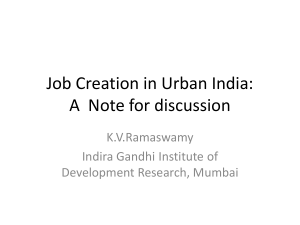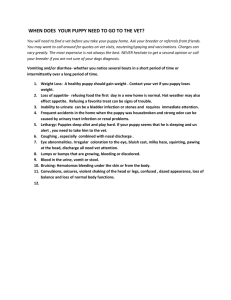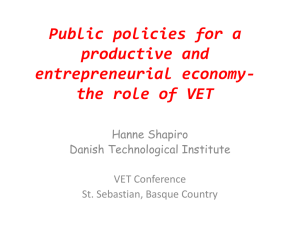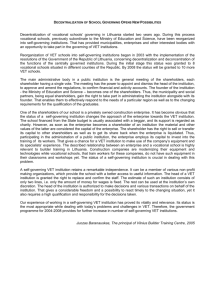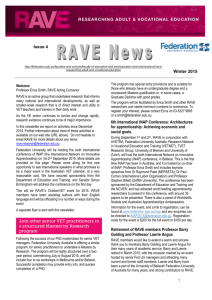RAVE News - Federation University Australia
advertisement
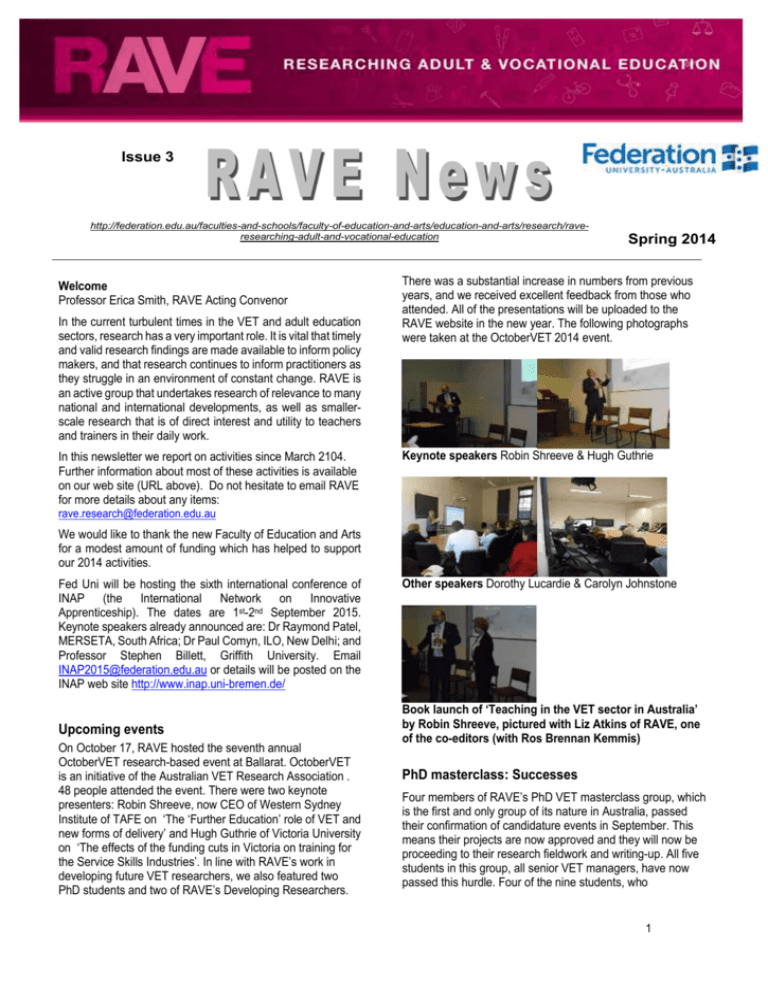
Issue 3 1 http://federation.edu.au/faculties-and-schools/faculty-of-education-and-arts/education-and-arts/research/raveresearching-adult-and-vocational-education Welcome Professor Erica Smith, RAVE Acting Convenor In the current turbulent times in the VET and adult education sectors, research has a very important role. It is vital that timely and valid research findings are made available to inform policy makers, and that research continues to inform practitioners as they struggle in an environment of constant change. RAVE is an active group that undertakes research of relevance to many national and international developments, as well as smallerscale research that is of direct interest and utility to teachers and trainers in their daily work. In this newsletter we report on activities since March 2104. Further information about most of these activities is available on our web site (URL above). Do not hesitate to email RAVE for more details about any items: Spring 2014 There was a substantial increase in numbers from previous years, and we received excellent feedback from those who attended. All of the presentations will be uploaded to the RAVE website in the new year. The following photographs were taken at the OctoberVET 2014 event. Keynote speakers Robin Shreeve & Hugh Guthrie rave.research@federation.edu.au We would like to thank the new Faculty of Education and Arts for a modest amount of funding which has helped to support our 2014 activities. Fed Uni will be hosting the sixth international conference of INAP (the International Network on Innovative Apprenticeship). The dates are 1st-2nd September 2015. Keynote speakers already announced are: Dr Raymond Patel, MERSETA, South Africa; Dr Paul Comyn, ILO, New Delhi; and Professor Stephen Billett, Griffith University. Email INAP2015@federation.edu.au or details will be posted on the INAP web site http://www.inap.uni-bremen.de/ Upcoming events On October 17, RAVE hosted the seventh annual OctoberVET research-based event at Ballarat. OctoberVET is an initiative of the Australian VET Research Association . 48 people attended the event. There were two keynote presenters: Robin Shreeve, now CEO of Western Sydney Institute of TAFE on ‘The ‘Further Education’ role of VET and new forms of delivery’ and Hugh Guthrie of Victoria University on ‘The effects of the funding cuts in Victoria on training for the Service Skills Industries’. In line with RAVE’s work in developing future VET researchers, we also featured two PhD students and two of RAVE’s Developing Researchers. Other speakers Dorothy Lucardie & Carolyn Johnstone Book launch of ‘Teaching in the VET sector in Australia’ by Robin Shreeve, pictured with Liz Atkins of RAVE, one of the co-editors (with Ros Brennan Kemmis) PhD masterclass: Successes Four members of RAVE’s PhD VET masterclass group, which is the first and only group of its nature in Australia, passed their confirmation of candidature events in September. This means their projects are now approved and they will now be proceeding to their research fieldwork and writing-up. All five students in this group, all senior VET managers, have now passed this hurdle. Four of the nine students, who 1 commenced in 2012, have withdrawn, due either to significant promotions or because of disruptions due to the VET cuts. The four successful students and their topics are listed below. Barry Wright passed confirmation earlier this year (see RAVE News Issue 2). Sharon Kerr: Assisting disadvantaged youth in Western Sydney to re-engage with education and gain employment. David Taylor: Teacher practice in the implementation of the Queensland settlement syllabus for migrants and humanitarian entrants under the Adult Migrant English Program. Teressa Schmidt: From novice to expert – how do VET practitioners develop advanced skills? Les Burr: The use of learning and teaching technology to widen participation for mature age, distance education learners located in rural and regional areas. The photograph below shows members of the PhD masterclass with some of the supervisory team at a workshop at Fed Uni’s premises at the Royal Society of Victoria in Melbourne in February. changing relationship between the Australian Army and national systems for Vocational Education and Training’. This research in the area of military social history aims to extend knowledge and understanding of the links between Australian Army training and wider national VET. The project will examine documentary sources to determine the state of military training and education at times of key national VET developments. Comparing the policies, priorities and practices in place within the Australian civilian and Army systems, the study will identify connections between these separate but linked VET systems, and suggest reasons those relationships may have changed over time. Carolyn will be working with associate researchers, Colonels Debra Bradford and Bill Monfries of the Australian Army, on this project and will be exploring the National Archive and Library records. She hopes that an improved understanding of how national VET developments affect the military will inform the future direction for Army VET policy. Three Minute Thesis Competition winner Congratulations to Azusa Umemoto, a RAVE PhD student, who was the winner of the Fed Uni heat of the ‘3MT’ (Three Minute Thesis) competition with her presentation "Early school leavers and their future careers". Azusa represented Federation University in the national Trans-Tasman Three Minute Thesis competition at the University of Western Australia on Monday 3rd November 2014. RAVE members’ research achievements since March 2014 A new grant for RAVE on the importance of qualifications for VET teachers Erica Smith has recently won a two-year Australian Research Council Linkage grant. The project’s research question is ‘Would more highly-qualified teachers and trainers help to address quality problems in the Australian vocational education and training system?’ Liz Atkins is also a member of the project team, which also includes researchers from University of South Australia and University of Technology, Sydney. We have five industry partners: the VET Development Centre, ACPET, NCVER, Federation Training and TAFE Queensland. ARC funding amounted to $120,000, with Industry Partner funds of $45,000. RAVE Developing Researcher’s national project Carolyn Johnstone has been awarded a small Army History Research Grant of $5,600 to complete a project on ‘The Erica Smith’s two current Australian Research Council Linkage projects, one on Recognising skill in jobs traditionally considered unskilled, and one on Enterprise RTOs (registered training organisations located within companies) are drawing to a close. Both will culminate in national stakeholder forums early in 2015, to feed back the findings to the major national policy figures in the respective areas. In a recent trip, Erica undertook consultation with English experts (academic, industry and policy) in relation to both projects. Details of the projects can be found on the RAVE web site under ‘Current Research’. Developing researchers Paul Street and Katrina Kavanagh, together with Steven Hodge, former RAVE member, completed the School of Education and Arts-funded project ‘How VET sessionals perceive their work’. The project involved in-depth interviews with 12 VET teachers working across Victoria, to learn about their work, careers and aspirations. The findings were presented at the AVETRA conference in April 2014. Katrina Kavanagh has completed her NCVER project under its Community of Practice program for practitioner researchers. It was about the use of video-conferencing for teaching and was based on the experiences of learners from partner TAFE Institutes in the Associate Degree in Training and Education at Fed Uni. The findings were presented at the NCVER ‘No Frills’ conference in July 2014. 2 Erica Smith has completed the small project auspiced by the Australian Council of Deans of Education Vocational Education Group ‘Satisfaction of students in VET and adult education teacher-education courses’. Erica worked with four people from other universities on the project. The survey of VET teacher-education students at six universities received 148 responses. A Faculty grant assisted with initial data analysis, and enabled us to feed each University’s results back to the respective contact person late last year. Some of the findings were presented at the Research in Postcompulsory Education conference in England in July, the ‘UPI’ TVET conference in Bandung, Indonesia, in November, and the AUSTAFE conference in Sydney in October. Erica Smith worked on a funded research project in mid2014 led by Hugh Guthrie: Review of the effects of funding approaches on Service Skills qualifications and delivery in Victoria. The project was funded by Service Skills Victoria $75,000. (Fed Uni component $25,000). Hugh Guthrie presented on the project at OctoberVET in Ballarat. Other researchers included Sally Burt (Fed Uni), Tom Karmel, Berwyn Clayton, and Pam Every. The report can be found at http://behc.com.au/REPORT.pdf New Grants Apart from the new grants already mentioned, Erica Smith has also won a nationally-competitive grant from the National Centre for Vocational Education Research (NCVER) on Employer training in a changed environment. The team also includes Professor Victor Callan, from the University of Queensland and Callan Consulting Group, two other Fed Uni academics (Jackie Tuck and Andy Smith) and Robin Shreeve, a Fed Uni Adjunct Professor. The grant was for $99,600. For details, see Employer training in a changed environment, or google the title on the NCVER web site. Publications since RAVE News 2 (RAVE members’ names are bolded) Books Brennan-Kemmis, R. & Atkins, L. (eds). (2014). Teaching in the VET Sector in Australia. Sydney: David Barlow Publishing. Each of the chapters in this textbook has been peer-reviewed by other academics and also, separately, by senior national figures in VET teacher-development. Book chapters Chapters from ‘Teaching in the VET sector’: Atkins, L. (2014). Reflective Practice in VET, in R. Brennan Kemmis and L. Atkins, Teaching in the VET sector in Australia. Sydney: David Barlow Publishing, pp. 143-155. Smith, E. (2014). The context of teaching in vocational education and training (VET) in Australia, in R. Brennan Kemmis, R. & L. Atkins, Teaching in the VET sector in Australia. Sydney: David Barlow Publishing, pp.1-20. Smith, E. (2014). Teachers working in partnership with industry, in R. Brennan Kemmis, R. & L. Atkins, Teaching in the VET sector in Australia, Sydney: David Barlow Publishing, pp.131-142. Golding, B. ‘Older men’s learning and literacies’, in A. C. Cree (Ed.) Literacies: The power to change, Volume 2: Literacy in a changing World, World Literacy Summit, Oxford: Oxford University Press, pp.105-115 Peer-reviewed journal papers Smith, E. (2014). Voices from a small discipline: How an education sub-discipline made sense of journal rankings. International Journal of Training Research, 12(3),227-241. Smith, E., Brennan Kemmis, R. and Comyn, P. (2014). How can the expansion of the apprenticeship system in India create conditions for greater equity and social justice? Australian Journal of Adult Learning, 54(3), 368-388. Smith, E. & Brennan Kemmis, R. (2014) Credit transfer from VET to Higher Education: A pathways policy meets a roadblock. Research in Post Compulsory Education. 19(2), 230-244. (‘Editor’s pick’ – first pick from previous two years, in Taylor and Francis ‘Spotlighted’ journal for July 2014.) Golding, B. 'Men’s learning: The conviviality of men’s sheds' in Fine Print, Vol. 37, No. 2, pp. 7-12. Non-refereed publications Golding, B. Preface , M. Radovan & S. J. Krasovec (Eds.) Older men learning in the community: European snapshots. Ljubljana: Birografica Bori. Refereed conference papers Atkins, L. (2014). Learning on the Margins: Experiencing low level VET programmes in a UK context Informing Changes in VET Policy and Practice: The Central Role of Research, 17th Annual AVETRA Conference, Surfers Paradise, 24-25 April. Junor, A., Hampson, I., Smith, E. & Smith, A. (2014). Views of skill in low-wage jobs: Australian security guards and cleaners. 28th Association of Industrial Relations Academics of Australia and New Zealand (AIRAANZ) Conference. Melbourne, 5-7 February. Smith, E. Smith, A, Hampson, I. & Junor, A. (2014). What do senior figures in Australian VET and industrial relations think about the concept of skill in work? Informing Changes in VET Policy and Practice: The Central Role of Research, 17th Annual AVETRA Conference, Surfers Paradise, 22-24 April. Other conferences, public addresses etc Angus, L. (2014). Revisiting the Sociology of School Effectiveness: Shaping Educational Policy in TechnicalManagerial Times, Annual Conference of the European Educational Research Association, Network 23, ‘Policy Studies and Politics of Education’, 2-5 September. 3 Angus, L. (2014). School Effectiveness and Educational Reform: A Sociological Critique, Fourth Meeting of the European Association for Research on Learning and Instruction, Special Interest Group on Educational Effectiveness, Southampton, 27-29 August. Atkins, L. (2014). ‘Getting qualified in woodwork’: Young people’s reasons for choosing VET programmes in the UK. NCVER No Frills Conference, Melbourne, 10-11 July. Johnstone, C. (2014) Exporting VET as a stabilizing response to conflict. NCVER No Frills Conf. Melb. 10-11 July. Johnstone, C. (2014). Governing adult education during crises: pointers for policymakers and practitioners. European Society for Research on the Education of Adults conference. Aalborg, Denmark, 18-20 June. Johnstone, C. (2014) Cap2Dev: a fresh concept for adult education in societies that are stabilizing after conflict. Human Security @ 20 Conference, Oxford, 25-27 June. Johnstone, C. (2014) Stabilizing Syria: the contribution of adult education. British Educational Research Association Annual Conference, London, UK. 23-25 September. Kavanagh, K. (2014). The use of technology to promote engagement and completion in the education sector. NCVER No Frills Conference, Melbourne, 10-11 July. Miller, L. & Smith, E. (2014) The Indian apprenticeship project & the transferability of the UK System. National Apprenticeship Service 5th International Apprenticeship Conference, London, 5 March. Smith, E. (2014). Refocusing on ‘core business’ for VET teachers. VET Practitioners’ Conference – Practitioners for the Future, Innovation and Business Skills Australia conf., Hilton on the Park, Melb.: May 7. (Invited plenary speech). Smith, E., Hodge, S., & Yasukawa, K. (2014). Students in Australian VET and adult education teacher education courses: Who are they and what are their views about what they are learning? Research in Post-Compulsory Education’s Inaugural International Research Conference of the Further Education Research Association, Oxford, 11-13 July. Umemoto, A. (2014). (RAVE PhD student). Early school leavers’ career choices & the factors influencing their career choice. NCVER No Frills Conf., Melbourne, 10-11 July. Awards and other recognition Erica Smith gave an invited keynote address to the Australian VET Research Association conference at Surfers Paradise in April: Smith, E. (2014). Apprenticeship: Not just a learning experience. Keynote speech to the Informing Changes in VET Policy and Practice: The Central Role of Research, 17th annual 2014 AVETRA Conf., Surfers Paradise, 22-24 April. Carolyn Johnstone and Erica Smith both gave invited plenary addresses to the AUSTAFE conference in Sydney in October. Photos can be seen at: https://www.facebook.com/tmansw/photos_stream?ref=page_internal Liz Atkins was part of a team of three people leading a keynote symposium at the British Educational Research Association conference in September. The topic of the symposium was ‘Youth Transitions in troubled times: NEETs, Vocational Education and Decision Making’. (‘NEET’ refers to people not in employment, education or training). Only three keynote symposia were selected for 2014 at this event, which is the largest educational research conference in the UK, attended by about 1000 researchers. Erica Smith led the Experienced Researcher Group of the Australian VET Research Association in a research roundtable with researchers from the National Centre for Vocational Education Research in Adelaide in September 2014. The roundtable, opened by NCVER’s outgoing Managing Director Rod Camm, enabled two groups of Australia’s leading VET researchers to share information and ideas, and plan joint activities. The focus was on the use of research to inform policy and practice. A booklet of current research by Experienced Researcher Group members has been produced, and can be obtained from Erica Smith. Barry Golding has been working for much of 2014 researching and writing a book, planned for publication during 2015, about the Men's Shed Movement, incorporating perspectives from the three countries aside from Australia (Ireland, the UK and New Zealand) where community men's sheds have flourished since 2009. In October, Barry Golding spent three weeks working in Europe: Valletta in Malta, Ljubljana in Slovenia, Strasbourg in France, Dublin and Kerry in Ireland as well as Manchester in the UK. This included refereed papers at three research conferences on older learning; and a keynote presentation to the ESREA (European Society for Research into the Education of Adults) Older Learners Research Conference in Malta. Barry was also invited, as Adult Learning Australia President, to participate in an International Conference in November on the 'Methods and Applications of Research in Literacy' in Seoul, South Korea, organised by the National Institute of Korean Languages. Liz Atkins visited UK in September and presented a seminar at the University of Huddersfield. Liz and Carolyn Johnstone both presented papers in the Post Compulsory Education and Lifelong Learning Special Interest Group at the British Educational Research Association conference in London. Annette Foley visited the University of Heidelberg in November, meeting with Professor Hartwig Weber and Professor Heinz Schmidt who have developed an online Master of Education program involving ‘at risk’ teaching strategies or ‘street pedagogy’. Annette discussed the possibility of potential pathways from Fed Uni courses, and an MOU that would include possible student exchanges between the universities. Annette has a particular research interest in alternative schools for disengaged young people. Liz Atkins presented an invited keynote address at the NSW Adult Literacy & Numeracy Council conference in Sydney in December. The address discussed employability and foundation skills curricula in the context of low attaining young people. 4

